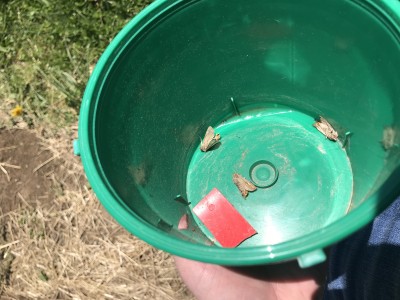Soil Temperatures and Insect Captures Remain Low in Southwest New York
Joshua Putman, Field Crops and Forage Specialist
Southwest New York Dairy, Livestock and Field Crops Program

Despite the cooler than usual weather, significant numbers of BCW and CAW have been recorded in our region. So what is a significant number of BCW? Many universities determine a significant flight of BCW as 9 moths over a two-day period. We do not look at our traps daily, only weekly, so we cannot be as accurate. Now that we have some traps that have hit this number, we should monitor the number of degree-days accumulated (base 50°F). It takes roughly 300 degree-days for BCW larvae to be big enough to cut corn plants (4th instar). This is not a scientific process but it gives us a good idea of when we should be out there monitoring for damage. There is no real degree-day thresholds for monitoring Common Armyworm. It will be roughly 100 degree-days to egg hatch. Grass hay fields and winter grains such as wheat and barley are favored egg-laying sites. Corn planted into a green cover crop will also need to be monitored carefully.
Upcoming Events
Boots in the Barn: Cornell Dairy Research Updates
January 13, 2026
January 20, 2026
January 27, 2026
February 3, 2026
February 10, 2026
February 17, 2026
February 24, 2026
Join us for some or all!
New York Certified Organic (NYCO) Field Crops and Dairy Meeting
February 10, 2026
Geneva, NY
Piglet Health 101
February 13, 2026 : Piglet Health 101 - Batavia, NY
Batavia, NY
This free workshop from the New York Pork Producers offers hands-on training in essential piglet care and processing practices, led by industry veterinarians from Passion for Pigs. No matter your experience level, this training offers takeaways for both new and experienced producers.
Announcements
Cows, Crops & Critters Newsletter Sponsorship
TRYING TO REACH GROWERS AND AGRIBUSINESSES IN OUR SOUTHWEST REGION OF NEW YORK?Weekly Email Update: Shared with 625+ households who have signed up with our program.
Monthly Paper Mailer: To reach our stakeholders and farmers who lack internet access, we send out a monthly mailer where your company's logo and contact information would be featured with a mailing list of 330+ households.
If you sponsor our weekly and monthly publications you reach approximately 955 households.





